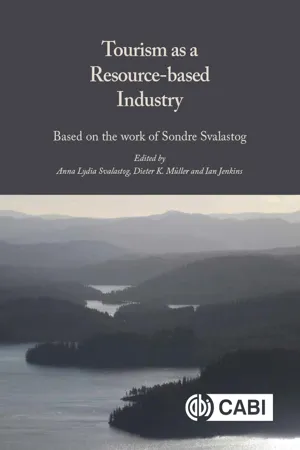
Tourism as a Resource-based Industry
Based on the Work of Sondre Svalastog
- 176 pages
- English
- ePUB (mobile friendly)
- Available on iOS & Android
Tourism as a Resource-based Industry
Based on the Work of Sondre Svalastog
About This Book
Tourism as a Resource-based Industry presents the conceptual framework of the Norwegian economic geographer Sondre Svalastog and functions as a practical tool for analyzing and identifying resources when working towards a more sustainable tourism industry.Tourism resources and their sustainability are analysed through the lens of a multidisciplinary approach which includes social, economic, cultural and natural dimensions. Contextual awareness is achieved by combining research-based knowledge with local know-how and information on local conditions. The book facilitates a way forward that examines both productivity and sustainability. The usefulness and value of Svalastog's conceptual work is demonstrated by a selection of new case studies by experts in the field, from different countries including Sweden, Norway, Slovenia, and the UK. This book: - Identifies local conditions and resources, climate change concerns, different types of tourists and a variety of challenges in high-cost and low-cost countries.- Considers how best to maximise potential and production, ensuring that both the host community and tourist benefits.- Provides a wide-ranging selection of case studies covering topics such as urban heritage, national parks, niche tourism and location-specific tourism products.- Presents ideas on how to secure sound planning within the industry, using conceptual and methodological tools. Tourism researchers and students will find this book helpful for understanding the development of tourism and how it can contribute to the UN Agenda 2030 which reflects the urgency for change, to secure cultural and natural resources, health and social resilience, and the stability of a socially constructed economy. Thus, tourism research needs to include a constant review and if required, renewal of processes that manage how society, culture and natural resources are used to achieve a balanced sustainable tourism process.
Frequently asked questions
Information
Table of contents
- Cover
- Title Page
- Copyright
- Contents
- Contributors
- Foreword: The Art of Science, or for the Love of Life
- Preface
- Remembering Sondre Svalastog
- Photographic Credits
- 1. Introduction: A Resource Approach to Tourism
- Section 1: Tourism as a Resource-based Industry
- Section 2: Case Studies
- Conclusion
- Index
- Back Cover